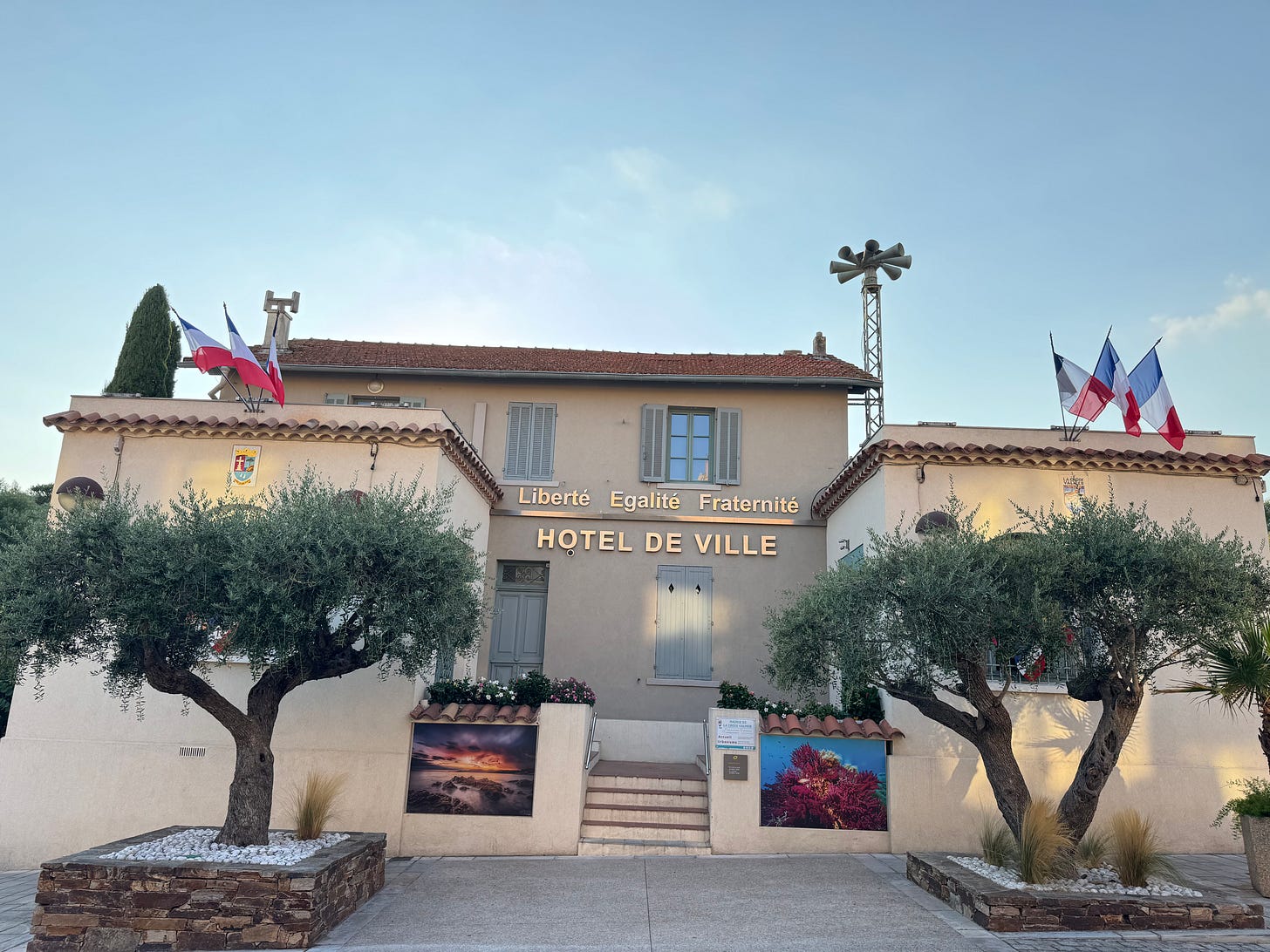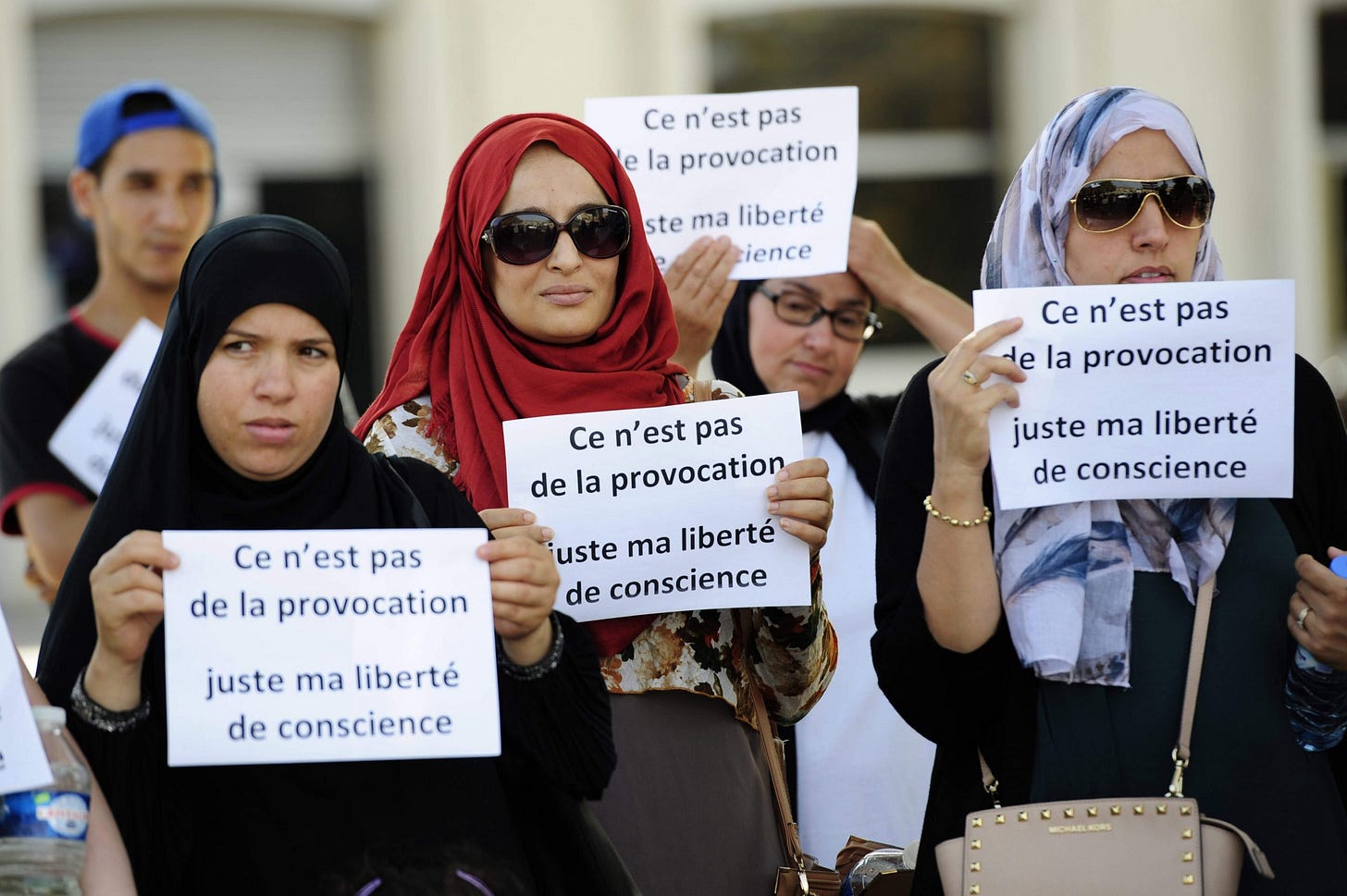The City of Man and the Eldest Daughter of the Church
Why liberty, equality, and fraternity find their true meaning only in God.
I am fortunate enough to have grabbed a few days with Katherine and her family in France, and it is impossible not to see the national motto carved into stone and civic memory (as per the above picture I took in the small town where we are staying): “Liberté, Égalité, Fraternité.” These words, proudly proclaimed and displayed, are the creed of modern France, born of the Revolution. They sound noble, superficially one might even say Christian. But their history tells another story: a story of rupture, of man setting himself in defiance of God, and of the enduring tension between the Gospel and the philosophy of 1789. And this is made painfully apparent when one walks into the local parish church for Mass, be it in the Pyrenees in Lourdes, High in the Alpine community of Haute-Savoie in Morzine, a town in Charente-Maritime like La Rochelle or Royan, or the warmth of the Côte d'Azur, one sees another France: cavernous churches with only a scattering of elderly women attending, presided over, usually, by an African priest imported from the missions. The state owns these magnificent buildings, ensuring their upkeep, but it also exerts subtle control over them, treating them as relics of heritage rather than living temples. They are monuments, not mysteries. France’s faith, once so alive, is now skeletal.
How did this happen? How did the “eldest daughter of the Church” become the most aggressively secular society in Europe? And what effects has this wrought on her people and her culture? What has resulted from France rejecting Christianity and replacing the faith which built her with a new tripartite creed that distills the aspirations of the Revolution and still defines the Republic today: “Liberté, Égalité, Fraternité.”.
The answer lies in the long arc of philosophical rebellion that took root in the Enlightenment and flowered in the Revolution. Voltaire, Diderot, and Rousseau cast aside the Church as guardian of truth and insisted instead that man, unaided, could define right and wrong for himself and build a new society on reason alone. This is exactly what the Biblical narrative consistently warns us against. It is the old temptation in a new guise: like Adam and Eve reaching for the fruit of the tree of the knowledge of good and evil, humanity was persuaded that it no longer needed God’s wisdom, that autonomy was the path to freedom. But just as in Eden, what was promised as liberation quickly bore the fruit of exile and death.
The Encyclopédie, the Parisian salons, and Rousseau’s rhetoric of the “general will” were, in essence, another Babel. Humanity gathered itself, convinced of its own powers, and sought to build a tower that would unite mankind under the banners of liberty, equality, and fraternity, but without God. The result was confusion, fracture, and violence, just as Genesis foretells. When man tries to build unity apart from the Creator, he ends up speaking a different language altogether: not the Word of truth, but the rhetoric of power.
The Revolution made this rejection explicit. In place of the Cross, the “folly” of Christ which St. Paul insists is true wisdom, they enthroned the Goddess of Reason in Notre-Dame itself. In place of grace, they raised the guillotine. The Church, with her sacraments, her hierarchy, her quiet witness of continuity, was not seen as mother but denounced as tyrant. Yet history shows that it was precisely she who remained faithful, holding out eternal truths against a society drunk on its own rebellion. The irony is unavoidable: in the name of Reason, France descended into irrational bloodshed; in the name of Liberty, the Revolution produced a new tyranny more total than the one it overthrew.
Of course, the Revolution did not arrive out of nowhere. For centuries France had been pulled between loyalty to Rome and the temptation of independence. Jansenism, with its harsh view of grace, produced a rigorist Catholicism that drove many away from the Church altogether, but it left behind a lingering suspicion of papal authority. Gallicanism tied the Church too tightly to the crown, so that when the monarchy fell, the Church looked like its accomplice. Then came the philosophes: Voltaire sneering “écrasez l’infâme”: Crush the infamous thing, meaning the Church itself; Diderot fantasising about strangling kings with priests’ entrails; Rousseau declaring man born free and enslaved by tradition. By the late eighteenth century, the French imagination was primed for revolution. Catholicism was seen less as a mother than a jailer, and reason was enthroned as the new god.
This trajectory did not end with 1789. It deepened. The 19th century brought Comte’s positivism, reducing reality to what could be empirically measured, stripping away metaphysics, mystery, and faith. Later, in the 20th century, Sartre and Beauvoir radicalised freedom itself, declaring that man has no essence, no God-given nature, he is condemned to be free, condemned to invent himself from nothing. Sartre’s existentialism was intoxicating in its promise of autonomy but hollow in its denial of truth. Beauvoir extended this rebellion into the realm of sex and gender, arguing that women must liberate themselves from “the eternal feminine” and the structures of family and motherhood. Their philosophy was one of perpetual revolt: liberation without telos, freedom without truth (I am wandering into Katherine’s speciality here!).
By 1968, these ideas spilled onto the streets. Parisian students daubed walls with slogans like “It is forbidden to forbid” and “Neither God nor master.” They demanded not just political change but an annihilation of authority itself: family, Church, tradition, all had to fall. And fall they did. Abortion was legalised in 1975. Marriage was steadily redefined. Contraception, divorce, and later same-sex unions were normalised, each step hailed as progress. And yet what has France reaped? Families fractured, fertility rates plummeted, psychiatric clinics filled. What Beauvoir described as liberation often left women and men more lonely, more exploited, more despairing.
The post-structuralists carried this even further. Foucault reduced morality to structures of power, Derrida deconstructed truth itself, Deleuze dismantled identity. In such a world, nothing is fixed, not even biological sex. “Truth” became not a reality to discover but a construct to dismantle. France became the vanguard of a new secular creed: freedom as atomisation, equality as sameness, fraternity as sentiment. But no society can live indefinitely on slogans.
And here lies the irony: the more France exalted relativism, the more it created space for absolutism; not Catholic truth, but Islam. While Catholic churches emptied, mosques filled. The Republic taught its children that all truths are equal, all religions are cultural expressions, all values negotiable. Into this vacuum came a religion that does not relativise but absolutises, that does not doubt but commands. Islam insists on the submission of the whole person and tolerates no rival in the public square. France, having rejected Catholic truth as “oppressive,” finds itself increasingly challenged by a rival creed that refuses to be privatised.
The statistics are stark. Barely 5% of French Catholics attend Mass regularly. By contrast, surveys show over 40% of French Muslims attend Friday prayers weekly. Catholic churches are shuttered or converted into apartments, while new mosques are built every year. The République’s secular creed, intended to neutralise religion, has instead weakened the only force that could provide a true foundation for liberty, equality, and fraternity. The result is a society fractured between nihilism and fundamentalism.





